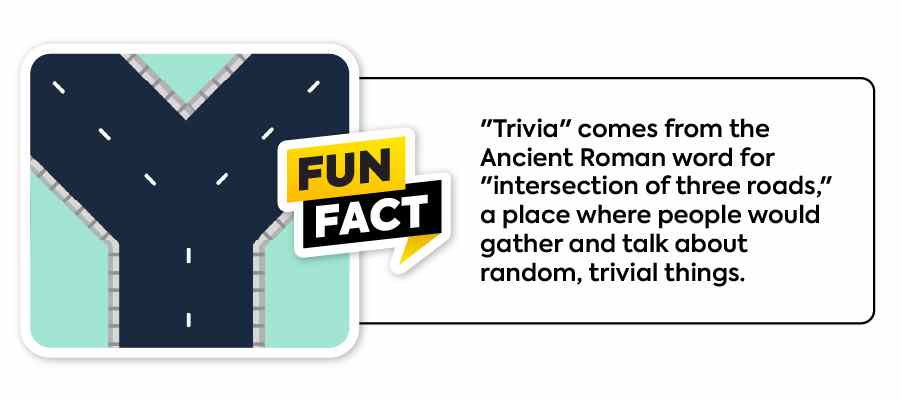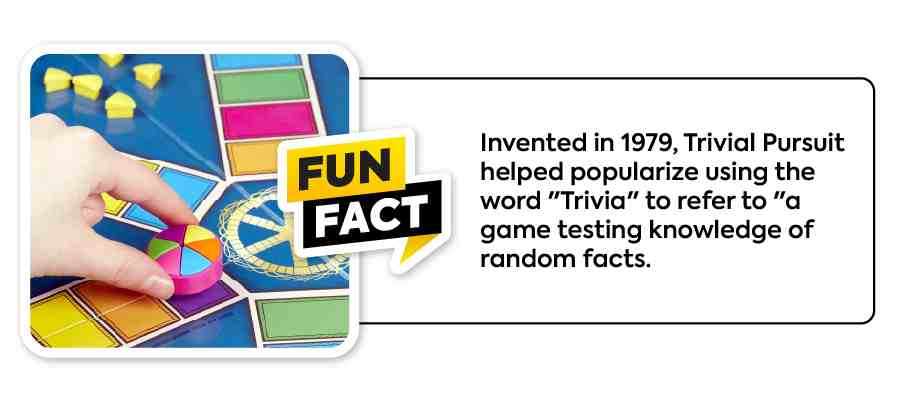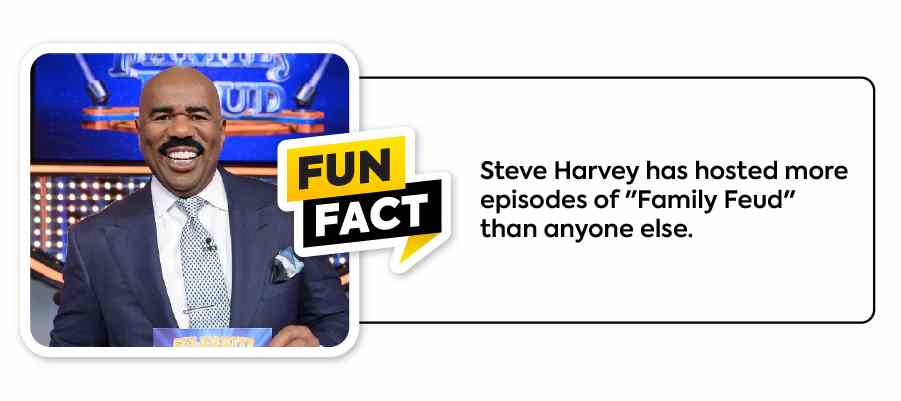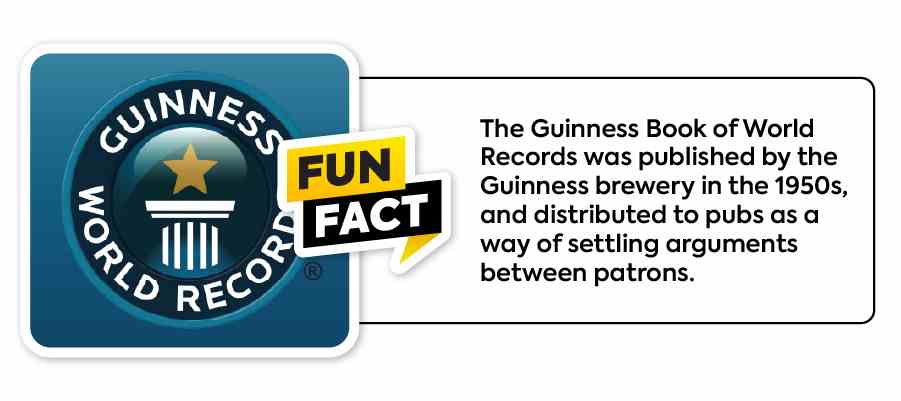Table of contents
People love trivia, and it can boost engagement on your site. But how do you write effective trivia that draws them in and calls them back for more? In this blog post, we explain how to write effective trivia questions for engagement.
If you’ve ever packed into a crowded bar on a weeknight, you’ve probably experienced the phenomenon known as “trivia night.” And if you have, then you know: trivia is serious business. Trivia night regulars take everything seriously, from ambiguously-phrased questions to their team’s pun-centric name (“Trivia Newton John” and “Tequila Mockingbird” are two perennial favorites).
In addition to being serious business, though, trivia can also be big business for publishers who know how to wield it effectively. People have a natural compulsion to test their knowledge of fun facts and obscure information. If you deploy trivia questions and quizzes on your site, you can leverage that compulsion for improved engagement — and revenue.
The only thing harder than answering a trivia question, though, is writing the question to begin with. We should know: Insticator’s Content Operations team writes thousands of trivia questions every week for our clients, to keep their user bases engaged and clicking.
In this blog post, we unveil some of the secrets to writing effective trivia questions that engage your audience without making them angry. We’ll also be sharing some trivia about trivia while we’re at it. Read on:
Why Use Trivia?

Integrating trivia into your website isn’t just about adding a fun feature—it’s a strategic move, one with tangible benefits for your site’s performance.
A strategically-placed trivia question can act as a last-minute deterrent for a user who was about to leave, or a lure to convince them to stay even longer. As they click through trivia questions, they are simultaneously exposed to your site’s other elements, such as links to top stories, comment sections, or ads. This engagement creates a ripple effect, encouraging users to explore more of your content and interact with different features on your site.
The ripples of this will spread out to your various key metrics. Firstly, as users spend more time clicking through trivia, your average time on page rises. This extended time-on-site is a critical factor in improving your search engine rankings on Google.
Plus, combining trivia with content recirculation tools—such as related articles or content recommendations—can further improve your bounce rate. When users are engaged with trivia, they are more likely to click on related content or explore other areas of your site, thereby reducing the likelihood of them leaving immediately after viewing a single page. This creates a positive feedback loop: improved engagement metrics lead to better search rankings, which in turn attract more qualified visitors and enhance engagement even further.
Beyond all that, though, trivia is also fun. Visitors will have more to do and more ways to interact with your site, boosting their overall satisfaction. Satisfied visitors are repeat visitors, and before you know it, you’ve got a solidly-growing audience.
Make It Thematic

A random pub quiz or trivia night is generally well-attended — but if you really want to draw a crowd, wait for a theme night. Harry Potter trivia, Star Wars trivia, The Office trivia: themed trivia makes people feel like they know what to expect, and lets them gauge how well they think they’ll do.
The same is true if you’re using trivia for engagement online. Building your trivia questions around a theme helps set expectations, and makes the challenge you’re throwing down more-specific. But it also allows you to provide greater relevance for your audience.
If you’re running a website for car enthusiasts, they won’t be enticed by trivia questions about pop music. Likewise, if your website is devoted to K-Pop music, people are unlikely to be interested in questions about the engine size of a 1965 Mustang. Whatever the focus of your website is, you’ve already filtered your audience towards people who feel strongly about that topic. Trivia questions grab the attention of your most-engaged members of that already-engaged audience.
Keep It Timeless

Quick: what’s the tallest building in the world?
As of this writing, it’s the Burj Khalifa in Dubai, which it has been since 2010. But if we’d asked that question in, say, 1990, the answer would have been the Sears Tower in Chicago. Not only is the Sears Tower not the tallest building in the world anymore, it’s also not called the Sears Tower anymore. And if you’d been asked anywhere between 1931 and 1972, the answer would have been the Empire State Building in NYC.
Skyscrapers take years to build, and many of the “world’s tallest buildings” hold that title for years or decades. But what about questions about who has the #1 single on the pop charts? Who is leading in the Presidential race?
You want to be able to spend your time working up new and fun trivia questions for your audience, not constantly digging to correct your previous ones to make sure they’re up-to-date. So part of this is to avoid referencing fleeting trends or specific current events that may quickly become outdated. Instead, focus on timeless topics and factual information that stand the test of time.
But part of it is phrasing. “What is the tallest building in the world?” is a question that changes periodically. “What was the tallest building in the world in 1950?” is a question that will always have the same answer no matter how high new skyscrapers climb.
In fast-paced industries like music, pop culture, and politics, you can utilize phrasing to ensure your questions are always accurate. “Who is the Democratic nominee for President?” changes every four years (or, uh, sometimes even faster). “What incumbent US President was the nominee for the Democratic party in June of 2024?” will always be the case, no matter what changes happen later.
Check Your Facts

Trivia depends on credibility more than anything else. You need the authority to tell someone they’re wrong and have them believe that. Once a teacher reveals they got something wrong, they lose control of the class — and once a quizmaster reveals they can’t keep their facts straight, the game is no longer fun to play. Accuracy is the most-important thing in trivia.
Part of this is rigorously fact-checking your information, even things you think you know. Knowledge is updating all the time, and many of us grow up to discover that things beloved teachers taught us in school are now considered wrong (or, worse yet, were already wrong when they taught it).
The other part is making sure to use credible sources when checking your facts. Wikipedia is not always reliable, for example (your teacher was right about that). Journals and official reference material, first-party sources like official documents, and news websites that are known for their fact-checking capabilities are all worth a check (and not all news is created equal).
If you’re unsure, check your information in more than one place. And if you can’t find answers that all agree, you should probably pick a less-controversial question. Trivia is about settled facts, not about starting arguments.
Make It Fun

This should go without saying, but trivia is supposed to be fun — that’s what separates a game of trivia from a round of homework. What’s fun for some people may not be fun for others, but there are still a few simple guidelines you can follow when trying to make your trivia a fun experience:
- Keep it light: nobody wants to answer a bunch of trivia questions about bummer subjects. Horrible tragedies, disease, bigotry — there may be exceptions, but by and large this isn’t the type of subject matter people turn to for entertainment.
- Crack a joke: tone helps separate trivia from the SATs, but that’s not all. If you play it right, you can use the joke as part of the clue. “What boxer famously gave Mike Tyson an earful during a June 28, 1997 title fight?” (Evander Holyfield).
- Mix it up: if you’re doing multiple-choice questions, occasionally throwing in an answer that’s obviously wrong can do a couple things: it throws your quizzer a lifeline by eliminating one potential option, but if it’s really wrong (like including Snoop Dogg in a group of former Presidents or cartoon dogs) you might also get a chuckle.
Remember, we’re doing this for fun — and users who are having fun will stick around for longer
Final Thoughts
Though we’re experts on using trivia for website engagement, you can use this advice for any trivia: if you’re writing trivia for a charity fundraiser, an ice-breaker at work or school, or a fun activity for a family get-together, all this advice still applies. Have fun putting it together, and that fun will be reflected in your trivia questions, too.
But if you are interested in using trivia for website engagement, Insticator is the solution for you. Our Content Ops team works day and… well, just during the day… to put together weekly trivia updates for our clients. Some of them now have thousands of questions for their users to puzzle their way through, which means hours of entertainment for them, and engagement for the website. Reach out to our team to learn more about how Insticator creates experiences that matter.











